Entrepreneurs and startups are predominantly linked to the urban scenario. Not so, we say! Meet women entrepreneurs from rural and semi-urban India.
Our work with rural women over the last 15 years has given us vast insights. In 2015, we partnered with The Indian Institute of Technology — Madras to study the Entrepreneurs from the so-called ‘bottom of the pyramid’. The aim of this project was to bring out the business instincts of rural and semi-urban Indian women in Tamil Nadu, and develop them into full-fledged entrepreneurs. While we at HiH India brought the expertise of mobilising and skilling women, IIT Madras’s mentors offered training to these women to create their own business models.
A bit of the background;
As of May 2019, HiH India has mobilized over 2 million women living at the bottom of the pyramid into 166,937self-help groups and created over 3.75 million jobs for the rural poor. Our model of job creation and women empowerment has been replicated in 11 countries across the globe. Additionally, we have developed over 400 sustainable rural communities in India.
Overview of the micro-enterprise sector
India houses massive untapped potential for growth in the form of the micro, small and medium enterprises (MSME) sector. Das. P (2017) points out that the MSME sector constitutes 80% of the total number of industries and produces 8000 value-added products. India has 51 million MSME units with 117 million people involved in the sector contributing to 37% of the nations GDP (MSME Pulse — March 2018 SIDBI). Spilt into manufacturing and service industries, this sector is known for being less capital intensive, more employment friendly and in a position to leverage Government schemes such as subsidies and other incentives (Das P, 2017), making this a sector an easy avenue contributing to Indian GDP.
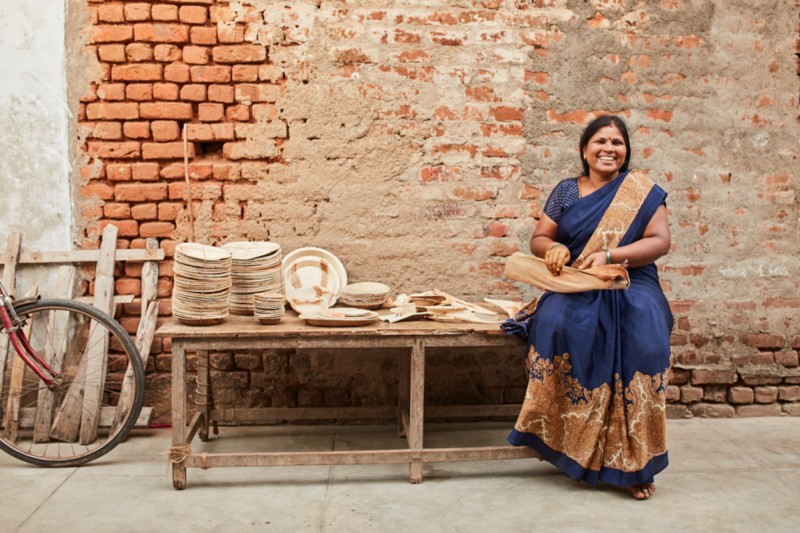
This is Gita, a rural woman entrepreneur who hit upon the idea of palmyra leaf cutlery as a product. She cashed in on the eco-friendly wave and is now a budding entrepreneur from rural Tamil Nadu. Find more such 'Stories of Change' here.
Our extensive work with rural women across the nation has consistently revealed that skilled hands and intelligent minds are aplenty. The Bottom of the Pyramid segment in India requires continuous working capital to boost and sustain their livelihoods. As elaborated by Harani B & Naresh Babu K S (2017), the lack of access of timely and adequate financial support coupled with lack of knowledge and low managerial ability leaves these women vulnerable and stagnant with almost no growth.
India and the SHG model
The Self Help Group (SHG) movement in India has been successful since 1991. Women often gain strength from a group as they collectively achieve feats they can’t as individuals. The group transforms itself into a space for expression, motivation and support. The SHG movement has been one of the main contributors to the development of entrepreneurship and promotion of enterprises amongst women through access to savings, finance and insurance. Women have established small scale enterprises which are seasonal with minimal increase in income.
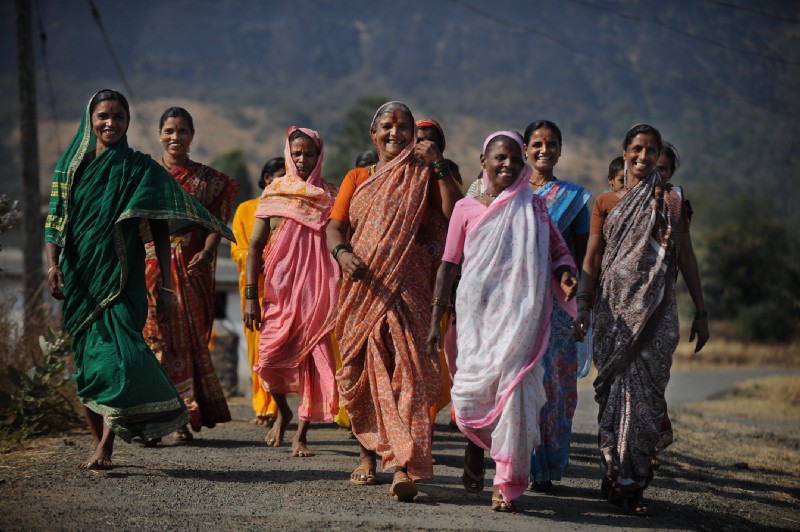
Apart from the ecosystem that is provided by the Government, women need handholding, mentoring and training in management which can help them create value and increase their income. The need of the hour is to help women with standardisation of their products, help them access markets through the use of technology to widen their outreach and to gain market share and scale their enterprises. With the increasing correlation between economic development and the empowerment of women, it is even more imperative that sustainable enterprises are established by these SHG women.
The Rationale — from Micro to Macro
We meet Santhi and her daughter, from a small town in Tamil Nadu. Both have lustrous long hair. What is the secret behind this we ask. With a smile, she says, ‘Thiyaa’s shampoo’. She lets us into the backstory, of how together with her husband, this woman entrepreneur runs a small setup that makes herbal shampoo and washing material. The products are neatly packaged and she distributes them to vendors across Tamil Nadu. The Hand in Hand India — IIT Madras training programme has helped her package and market her product. She also learnt proper accounting methodology and realised its importance only after attending the training. The training also connected her to like-minded rural women entrepreneurs, providing her with a support group of friends and business partners!
With support of the training and connections through a technology application, her income has increased by INR 60,000 per year! She is not alone in this success. Take the case of Sakubai from rural Madhya Pradesh, who's made it to the top too!
Today, the rural Indian woman is no less than her urban counterpart — her entrepreneurial spirit and yearning to be financially independent are phenomenal. Skilled in many trades, Self Help Group (SHG) women from rural India typically run micro-enterprises or family based enterprises (investment of INR 20,000–30,000). To scale their enterprises to the macro level (sustainable micro enterprises) access to formal institutional finance, technical expertise, mentorship and management skills (including preparation of a business plan, SWOT analysis, marketing, accounting and legal support) is missing.
The lack of collaterals makes access to credit a challenge. The bigger challenge however, is the lack of awareness and availability of agile business training for these entrepreneurs that prevent them from reaching scale and sustainability. It was under this context that HiH India, in partnership with IIT Madras introduced the training programme for marginal women entrepreneurs in Tamil Nadu in 2016.

Swapna lives in Pondicherry and runs her little toy-making enterprise. She loves what she does, and contributes to her family income as well.
A boon to the women at the bottom of the pyramid, this programme provided them with an opportunity to mingle with peers, learn management principles and scale their businesses. The objective of the training program was to build the capacity of these entrepreneurs to expand their business and provide them with high quality inputs in the areas of marketing, finance, legal, information technology and banking. The programme was designed that the learning went beyond the classroom with mentoring support and access to bank credit.
Hand in Hand India with its experience in the women’s SHG movement in India identified women entrepreneurs with a fire in the belly. These women do not have business track record documents such as bank statements or balance sheets and their individual bank credit requirements are quite large — a vaccum not addressed by the SHG bank linkage programme!
IIT Madras’ experienced faculty delivered the lectures and connected the women to alumni as mentors who provided handholding support. Credit support came from banks, making it a holistic programme.
The Training
The training programme for micro women entrepreneurs was conducted for 3 years from 2016 to 2018. Each year it was conducted over a period of 5 days at the Hand in Hand Academy for Social Entrepreneurship, where professors from IIT and leading professionals delivered lectures on different aspects of the business. The lectures were delivered in Tamil, to enable the 200+ participants to get a good grasp of the subject.
The women were selected through a rigorous selection criteria set by faculty of IIT Madras and Hand in Hand India. Education qualification, age, a two-year business track record and family consent were the criteria used. Additionally, women with ideas but having difficulty to establish or scale their enterprises were also included for the training.
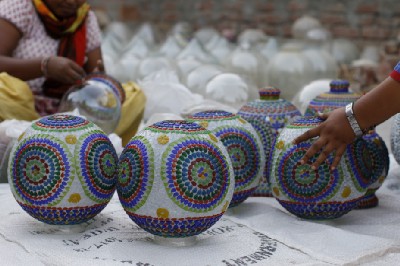
A large number of the participants in the program were engaged in tailoring and jewellery designing business and a few were running beauty parlours, grocery stores, and preparation of food articles.
As a follow up of the training, to assist women in getting credit, Hand in Hand India staff were involved in the preparation of business plans in product, service and trade based enterprises enabling women to translate their dreams into reality. This was the first step required to get access to formal credit.
The participants were subsequently mentored by Hand in Hand India and the staff appointed by IIT for a period of 6 months. Mentors were appointed to provide business advice and technical support. Hand in Hand India liaisons with government departments to ease the burden of regulatory compliance and obtain support under various government schemes for all entrepreneurs. After the 6 months, a reflective session was called for. The reflective sessions enabled the Partners to understand the effectiveness of the Training Program.
Impact of the Programme
The training program addressed the growing need of women entrepreneurs to obtain high-quality inputs in different areas of business and management. The inputs helped the participants to critically analyze their business, assess gaps, and develop solutions to improve their revenue growth and profitability. Through this programme, the participants had an opportunity to meet with IIT alumni, mentors, stakeholders like banks and RBI which boosted their confidence. They felt that they were recognized and that their voices were being heard.
Outcome 1: a better understanding of business concepts and improvement in business acumen
The areas of marketing and financial decision making is where these entrepreneurs benefitted in. The identification of market segments, understanding of customer needs and behaviour, providing a minimum level of service, and the importance of building a unique brand were important lessons learned. Translating these insights into a revenue model was another important learning for the women.
The visioning exercise enabled these entrepreneurs to identify goals and work on areas that would help in achieving these goals. An important lesson learnt was the need to focus on individual strengths to take advantage of market opportunities.
Preparing a business plan enabled a deeper understanding of the drivers of profitability. Most women entrepreneurs in the Program had a good grasp of costs and expenses, but seeing them as variable or fixed reinforced their intuitive understanding of the why profits behave as they do in real life. Another important learning from the business plan exercise was to make decisions based on cost-benefit analysis of the various options that were available to them and decide on the best ones.
A major gain from the Program for these women was changing their mindset to that of an entrepreneur as opposed to one of being a housewife. Making it gender neutral, on the last day of the reflective session it was heart-warming to see husbands of the women entrepreneurs come out in complete support of the entrepreneurial journey of their wives, giving moral courage and emotional support to these entrepreneurs. The behavioural change brought about by the programme on the family of the women was highlighted when the men proudly professed, ‘our wives came home from the training and coached us on business principles!’.
Outcome 2: Understanding the process of raising capital for their business
The business plans prepared by these entrepreneurs were reviewed by Hand in Hand India and inputs given to strengthen these plans. The business plans were then submitted to partnering banks for funding support. The training was instrumental in coaching the women on pricing sensitivities, interest rates and most importantly informed decision making when it came to accessing credit!
At the end of 3 years, a total of 150 business plans were prepared and 62 loan applications were submitted to banks and other financial institutions, and 45 women entrepreneurs received a total funding sanction of approximately Rs.160 lacs. Broadly the request for loans have increased over the 3 years, but the mix of institutions disbursing loans have changed from banks to a microfinance institution, mostly due to tightening of loan covenants of the banks.
Hand in Hand India has supported these women entrepreneurs by establishing a new loan department to cater to the needs of these entrepreneurs and has a new lower interest rate product for this segment.
Outcome 3: Scaling up the business
Several women entrepreneurs, who had established business prior to joining the Program, took initiatives to expand their business. Their ideas included expansion to intricate aari embroidery under tailoring business, packaging and sales of henna under beautician/beauty parlour training, including ice cream and cool drinks in grocery stores, adding men and children's clothing in garment stores. Introduction of evening tiffin services based on demand, stationery products in ageneral store and additional varieties of animals in poultry and milch are other examples. The training provided the women with the opportunity to look beyond the traditional work structure and add on value added services based on consumer demand. Hand in Hand India has encouraged these women to network with other women within the SHG ecosystem that Hand in Hand India supports and also provided market linkages through WhatsApp and portal.
Anuradha of Ambika Garments has provided employment to several SHG women entrepreneurs and employs 15 women tailors. She now purchases raw material from wholesale market and sells her garments across 3 districts of Tamil Nadu.
Outcome 4: Peer group learning
The training programme acted as a platform where women entrepreneurs from a plethora of trades came together for peer group learning, connecting with each other, learning about each others strengths and businesses. By connecting with each other on smartphones applications, they have formed a close network for trading products amongst themselves, making the programme in itself a tool for market linkages. They understood the importance of networking and understanding business opportunities to work together.
SUCCESS STORY: Redefining Her Life as an Entrepreneur
What started out as a small family-enterprise of leather footwear and bags has mushroomed into a full-fledged company with eight working employees. Mohana Mary, the 38-year-old entrepreneur used to help her husband in the leatherwork, but never even dreamt of starting her own company.
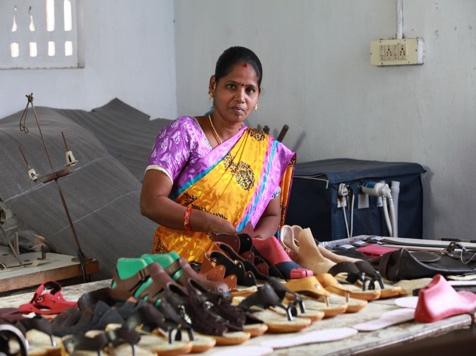
Mohana Mary runs a successful footwear brand
She started a small-scale venture in 2013 and has been able to gradually increase its reach. Her brand, Magi Footwear has grown immensely after associating with Hand in Hand India’s self-help group peer network for selling her products. “I used to only get small orders. But after connecting with other SHG women at HiH India, I have progressed to bulk orders — even outside my region of Chengalpattu”!
The IIT Madras training she adds, provides a well-rounded understanding of the business. This also enabled her to understand the need to prepare a business plan to envision the future of her business. Her effective planning and support from mentors have ensured close to doubling of her customer base and an increased profit of INR 30,000 per year! In a move to expand her business, she has now applied for a business loan of INR 5 lac to set-up a factory cum showroom.
Way Forward
The success of the programme has enthused women entrepreneurs as it comes as a package with training, access to credit and follow up. The certification from IIT Madras is like a door opener for many opportunities. The success in Kanchipuram can be replicated in other districts in Tamil Nadu and other states for more participants to get benefitted out of the training.
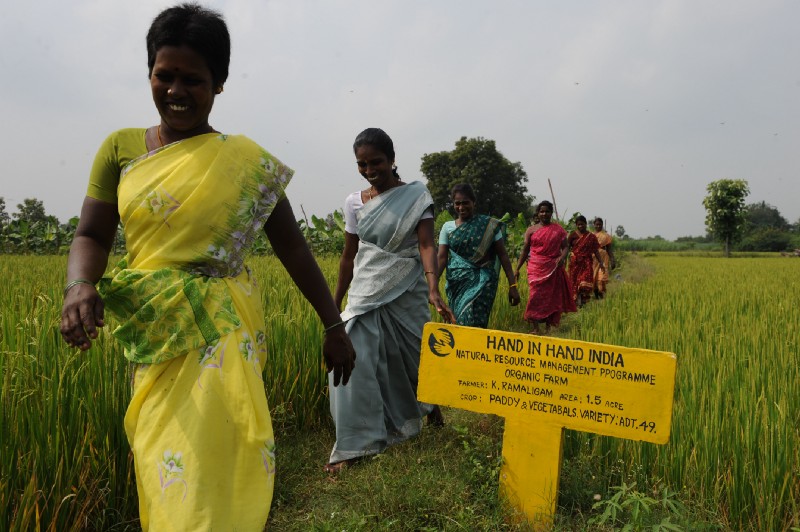
Follow up of success of the enterprises and yearly recognition through awards can further motivate the women and encourage more women to take up entrepreneurship. With additional training on soft skills and technology, the new batch of entrepreneurs in the coming years can reach a stage to directly pitch their ideas to angel investors thereby making a significant contribution to the economic growth of our country.
Hand in Hand India, is a public charitable trust working to alleviate poverty through job creation and integrated community development across 16 States of India. Registered in 2002, the organization works in interrelated areas of child labour elimination and education; women empowerment through skilling and access to credit for job creation; skill development; health and environment.






